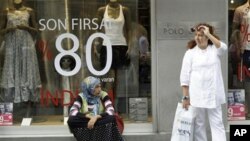While most of Europe struggles to secure economic growth, the Turkish economy has been booming. The country's economy has recovered rapidly from the ongoing economic crisis, posting 10.3 percent growth in the second quarter, tying China for the fastest growth in the G-20. But, analysts warn, dark clouds could be on the horizon.
At one of the many factories of Aydinlar Construction, business is booming. The company not only builds large construction projects, it also produces construction materials and is a supplier of such things as turbines and pumps.
One of the executives Omer Aydinlar says its success comes from Turkey's deepening ties with its Middle Eastern neighbors.
"[The] Middle East is very important for us. There is a big change actually, more and Middle Easterners especially from the UAE, are coming to Turkey. And with the changing laws and environment in Turkey there is a lot of investment coming to Turkey and there is a lot of partnerships being established with the Middle Easterners. And of course once they come to Turkey and establish those partnerships and [do] business with Turkey, they pull those Turkish investors and businessmen back to their country, back to the region as well."
Analysts say the Turkish government's fostering ties with its Middle Eastern neighbors is a part of wider initiative to diversify Turkey's dependence on the European markets. But it’s not only the Mideast that Turkey has its eyes on.
A special trade promotion video has been produced by the Turkish business confederation Musiad, aimed at African markets. Omer Bollat, former head of Musiad, says Turkey has managed to successfully weather the world economic turmoil partially by diversifying its target markets in business.
"Turkey has also been opening up to Eurasia markets, the Middle Eastern Gulf countries and African countries -- particularly North African countries."
That policy is paying dividends resulting in record exports.
The robust nature of Turkey's recovery also lies in the strength of its financial sector, says chief economist Emre Yigit of the Turkish trading house Global Securities.
"We learned our lessons from the crisis in 2001 to 2002, when we underwent our own little banking collapse, which cost us something like 30 to 35 percent of [our] GDP, by the time we cleaned up all the mess."
The country's banking sector after the introduction of IMF policies following its banking crisis, is among the best regulated and controlled banks in the world. The levels of private debt too are among the lowest in the G20 and the government this year has cut its budget deficit.
Yigit says now , things are about as good as they can get, but warns of storm clouds on the horizon.
"The fact that we are outgrowing our European trading partners by a factor of between five to 10 times this year means our current account has plunged to a deficit and is likely to widen further next year -- at which point we will be running the third or fourth current deficit in the world. I am not sure that is sustainable even in the medium term."
Analysts agree that while its recovery has been impressive, Turkey's dependence on imports and domestic demand is magnifying a potentially fatal flaw: a blossoming deficit financed by speculative investments. That could mean the end of the Turkish economic party followed by a severe hangover.
Turkey Shows Robust Growth, But Warning Signs Are Ahead
- By Dorian Jones










